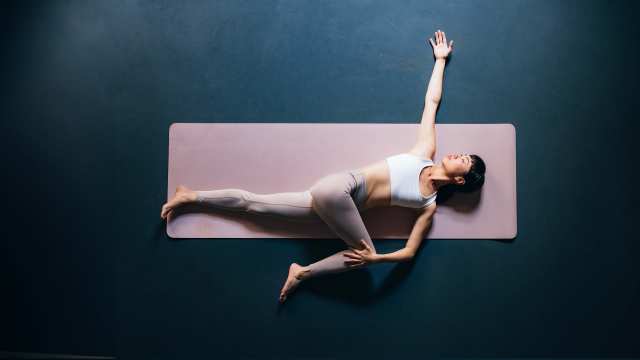Optimize Your Morning Routine

Think of your morning routine like the newly-laid foundation supporting the construction of your dream home. If it’s solid and the consistency is right, your exciting new life will spring up on top of it. But if your foundation is shaky, construction will be problematic and unpredictable at best.
Experts agree that optimizing your morning routine lays the groundwork for happiness, peace of mind, and productivity — but with countless books, podcasts, and articles on the market promising to reinvent your morning, how do you know which routine is right for you?
The truth is, there’s no one-size-fits-all approach, says wholistic health coach and Roundglass yoga teacher Leah Cullis. Optimizing your morning will take some trial and error, and it’s likely to be a lifelong work in progress. What works for you in your 20s, say, may not be what you need in your 40s. If your goal is to set yourself up for success, then each day ask yourself: “What does success look like today?” (Hint: It’s not always about productivity and plowing through to-do lists.)
“Every day we have a blank canvas,” says Cullis. “In your earliest moments, you create the roadmap for how you want to feel, what you want to accomplish, and how you’ll show up. The simple steps you take will set the tone for what’s to come.”
With that in mind, let’s look at the most effective ways to optimize your morning routine.
How to Maximize Your Morning
Routines promote healthy habits because they act like a shortcut for the brain; once established, they don’t require too much effort and can ease the burden of decision-making and choice fatigue.
Instead of asking yourself when you wake up, "Should I go to the gym today?" a solid routine helps you inherently know: Today is Tuesday. On Tuesdays I go to the gym. No over-thinking or decision-making is required.
Research also shows that a morning routine can increase happiness, boost confidence, and improve performance: In fact, one survey of 1,000 people found that the habits you establish in the morning will help you feel happier, less stressed, and more fulfilled at home and at work.
Habits to Add to Your Morning Routine
To get started, try establishing some research-backed habits that will make it easier to prioritize your wholistic wellbeing throughout the rest of the day.
Here’s how:
Before you open your eyes, set an intention for the day ahead. “Put one hand on your heart, and one on your low belly,” says Cullis. “Then ask yourself: How do I want to feel today?” Keep your mind and heart open to whatever comes up. The simple ritual of intention-setting helps people accomplish their goals more easily because it enhances self-discipline and self-control.
Jacqueline Pirtle, a mindfulness and happiness coach and author of "365 Days of Happiness," says your first thought each morning should be something positive or aspirational like: "This will be and already is the best day ever." Or, "I am healthy, abundant, successful, and happy."
2. Don’t Reach for That Phone
According to combined global research, somewhere between 46% and 71% of people check their phones before getting out of bed — even though similar data has established a clear link between consuming digital content in the morning and people who reported having a bad day. “As soon as you reach for the phone, it pulls you away from your inner wisdom and out of your power,” says Cullis.
What’s more, morning offers a unique transition time, as the brain moves from sleep to wakeful states, says Roundglass senior researcher Rebecca Acabchuk. Going straight to your phone jolts your brain immediately into a focused beta state, so you miss out on the critical transition through theta and alpha states, she says: Theta and alpha offer precious, peaceful space for the brain to reflect, and connect to creativity and intuition.
So rather than checking the headlines or scrolling your social feeds when you open your eyes, try connecting with your inner wisdom — and your highest energy — instead. To do this, place your hands purposefully on your body (try your abdomen and the crown of your head, says Cullis) and concentrate on sending grounding, loving energy to those points for at least 12 seconds. Listen to what’s calling you out into your day.
3. Hydrate
Drinking enough water is crucial to warding off fatigue, regulating your body temperature, and keeping your cells and organs happy and healthy. Drinking a big glass of water first thing in the morning is essential for vibrant health and concentration, Cullis says.
Mind-body bonus points if you add apple cider vinegar and lemon for extra detoxification and a boost of vitamin C: “When you’re clear and hydrated, you’re more ready to absorb nutrients and experiences. When your mind is hydrated, you’re more present,” says Cullis.
4. Practice Gratitude Journaling
Gratitude improves overall wellbeing, increases resilience, and can reduce stress and depression — while journaling (especially first thing in the morning) has been shown to calm anxiety.
Hal Elrod, international keynote speaker and author of bestselling book "The Miracle Morning," recommends writing down between one and three things you’re thankful for when you wake up each day. Keep it simple, he says, and remind yourself that you already have what you need to be happy and feel good.
5. Exercise
Exercising early translates into better energy levels throughout the day. In fact, one 2019 study from the "British Journal of Sports Medicine" found that a morning workout improves attention, memory, visual learning, and decision-making. But you don’t need to run a marathon before breakfast to reap these benefits. Even if you only have a few minutes to gently move your body, that’s OK. Find what works for you.
Try some light yoga or Sun Salutations, says Cullis: “They hold the intention, energy, and brightness of a new day. When we bring that energy — that intention to stay committed and burn brighter each day — we get more out of it. We can’t force a morning routine; we have to commit and bring reverence and intention to uplift ourselves.”
Make the Most of Your Morning
Don’t try everything all at once. Elrod says going slowly when integrating change into your routine is key. Research has shown the more we try to change at once, the more likely we are to fall back into our old routines.
If you lean into change instead of leap, he says, you’re more likely to stick with it. The most important thing to remember is to make your routine your own, says Cullis. You can mix and match. Add in a practice or two, and give yourself some space to see how your body and mind respond.
Try this class, Vinyasa Yoga Basics with Roundglass yoga teacher Leah Cullis, to incorporate some gentle Sun Salutations into your morning routine.
Key Takeaways:
- Optimizing your morning helps set the tone for the day and promotes healthy habits all day long.
- The ritual of intention-setting helps accomplish goals more easily because it enhances self-discipline and self-control.
- Research clearly links morning doom scrolling with having a bad day.
- Writing out what you're thankful for can help reduce stress, anxiety, and depression.








